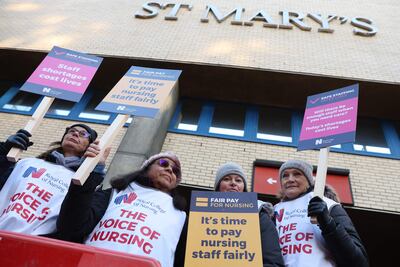The Bank of England has raised UK interest rates by 0.5 per cent to 3.5 per cent in its ongoing attempts to rein in inflation.
This is the ninth consecutive rise in interest rates since December 2021. Interest rates in November were already at their highest for 14 years.
UK inflation was 10.7 per cent in November, down from a 41-year high of 11.1 per cent in October. The Bank of England (BoE) has an inflation target of 2 per cent.
Members of the BoE's rate-setting Monetary Policy Committee (MPC) were split three ways in their latest decision.
Six of the committee's nine members, including Governor Andrew Bailey, voted for the 0.5 per cent increase. Catherine Mann favoured a 0.75 per cent rise, while Silvana Tenreyro and Swati Dhingra voted for rates to stay unchanged at 3 per cent.
Economists had widely expected the 0.5 per cent rise on Thursday. In November, the bank raised rates by 0.75 per cent, its largest increase in three decades.
What caught many economists by surprise was the three-way division of opinion within the MPC.
"While the 50 basis point (0.5 per cent) increase in the bank rate was as expected, the extent of the divisions across the committee is an eye opener. While it is normal to see policymakers disagree towards the end of a rate cycle, the split makes it more difficult to predict the extent to which interest rates will rise," said Philip Shaw, the chief economist at Investec in London.
The split on the MPC caused a few concerns in the markets.
The British pound weakened against the US dollar immediately after the decision, falling to about $1.23. UK government bond prices were also lower.
Central banks fight inflation
Today's decision was a balancing act between quelling inflation and not slowing economic activity too much, thereby making the widely expected recession even worse.
Not that the Bank of England is alone among the world's central banks in its efforts to stamp on inflation.
The BoE became the latest to follow the lead of the US Federal Reserve, which also raised its benchmark rate by 0.5 per cent on Wednesday.
The European Central Bank also raised its rates by 0.5 per cent on Thursday. The central bank for the 19-country eurozone raised its deposit rate to 2 per cent.
Switzerland’s central bank, meanwhile, raised rates by 0.5 per cent and the central bank of Norway increased rates by 0.25 per cent.

Wage demands
In the face of strikes from rail workers, nurses, postal workers and others, the government has prioritised reducing inflation. Unions are demanding wage increases in line with inflation, but on average the government has offered public sector workers pay rises of 5 per cent.
“I know this is tough for people right now, but it is vital that we stick to our plan, working in lockstep with the Bank of England as they take action to return inflation to target. The sooner we grip inflation the better. Any action which risks permanently embedding high prices into our economy will only prolong the pain for everyone, stunting any prospect of economic recovery.” said UK Chancellor Jeremy Hunt after the rate decision.
Rates to rise further in 2023
Economists see UK interest rates rising steadily in the first half of next year, and then possibly start to reduce towards the end of 2023 or early in 2024.
"Following this [rate increase], we could see the bank adopting a wait-and-see approach, with no change to base interest rate as inflation gradually eases during the rest of 2023, and the full impact of higher rates feeds through to lower activity," said Yael Selfin, chief economist at KPMG UK.
"Cuts to interest rates could come as soon as 2024 as the government tightens its purse strings and the economy needs help after the expected recession," she added.
"Overall, the market expectation is for the UK bank rate to rise to 4.5 per cent by mid-2023. This time the MPC seems OK with this assessment, as it dropped its guidance in November [when rates were expected to top 5 per cent in 2023] that the path for interest rates implied by financial markets was too aggressive.” said Janet Mui, head of market analysis at RBC Brewin Dolphin.
With inflation at 10.7 per cent, it is five times higher than the BoE's target. but if the bank put up interest rates by too much too fast, it risks making the outlook for the UK economy much bleaker. But without interest-rate rises, inflation could seriously erode prospects.
"There are going to be more rate hikes. They're not done. There's an element that the bank will stop a little bit before what markets are currently anticipating them to get to. Their own numbers have been pointing to a recession for a little while, and they've still materially hiked interest rates despite that. So I don't think that's going to stop them," said Vivek Paul, UK chief strategist at the Blackrock Investment Institute in London.
"We are not convinced that the UK’s inflation troubles are clearly behind us, and therefore suspect the BoE is still some way away from peak rates." said Karen Ward at JP Morgan Asset Management.
"Inflation may be coming down but it would be premature for the BoE to claim victory in the fight over inflation. The BoE may be able to moderate the pace and speed of interest rate hikes, but we believe we are at least 100 basis points (1 per cent) from the peak."

